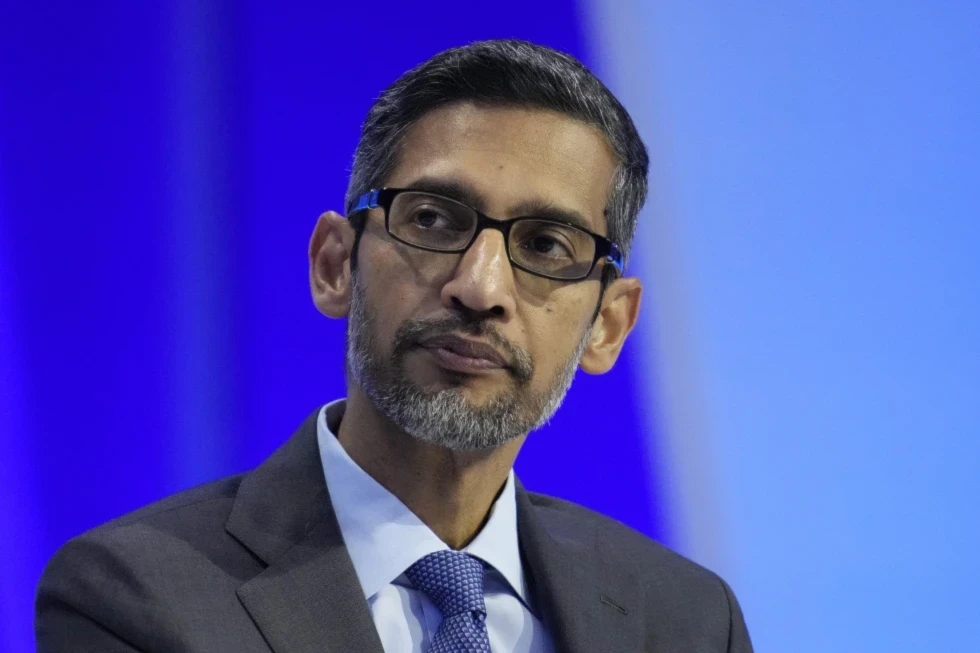Israeli-linked Wiz deal puts Google cloud data under the microscope
Google’s $32 billion acquisition of Wiz hands over significant control of its cybersecurity infrastructure to a company founded by veterans of Unit 8200, "Israel’s" elite military intelligence unit.
-
 Sundar Pichai, CEO of Google and Alphabet, takes part in a discussion at the Asia-Pacific Economic Cooperation (APEC) CEO Summit, on November 16, 2023, in San Francisco (AP)
Sundar Pichai, CEO of Google and Alphabet, takes part in a discussion at the Asia-Pacific Economic Cooperation (APEC) CEO Summit, on November 16, 2023, in San Francisco (AP)
Google’s recent announcement to acquire Israeli-American cloud security firm Wiz for $32 billion has sparked widespread debate. The massive deal, which amounts to 65 times Wiz’s annual revenue, has drawn attention to Google’s deepening ties with Israeli military intelligence, Scheerpost reported.
In its press release, Google claimed the acquisition would “vastly improve how security is designed, operated and automated, providing an end-to-end security platform for customers, of all types and sizes, in the AI era.”
However, concerns are mounting over the safety of user data, especially for critics of Israeli policy, given Wiz’s roots in "Israel’s" military intelligence. All four co-founders, Yinon Costica, Assaf Rappaport, Ami Luttwak, and Roy Reznik, are veterans of Unit 8200, "Israel’s" elite cyber and surveillance division. The company’s workforce includes nearly fifty others with similar backgrounds.
“That experience showed me the impact you can make when you combine great talent with amazing technology,” Rappaport said of his time in the military.
Former Unit 8200 members have played key roles in the development of powerful digital surveillance tools, including the infamous Pegasus spyware. Governments around the world, including those in Saudi Arabia, India, and the UAE, have used Pegasus to monitor political opponents, activists, and journalists, most notably Jamal Khashoggi, before his assassination in Turkey. All Pegasus exports required Israeli government approval, which reportedly also granted "Israel" access to harvested data.
Edward Snowden revealed that the US National Security Agency (NSA) has shared American citizens’ data with Unit 8200. “I think that’s amazing…It’s one of the biggest abuses we’ve seen,” he said.
Cybersecurity market
Israeli intelligence agencies often rely on private companies like Wiz, which operate outside the military chain of command. This gives the state plausible deniability in cyber operations. As Haaretz noted, “Who owns [these spying companies] isn’t clear, but their employees aren’t soldiers. Consequently, they may solve the army’s problem, even if the solution they provide is imperfect.”
Beyond spyware, former Unit 8200 agents now dominate much of the cybersecurity market, including major VPN services. A MintPress investigation found that three of the six largest VPNs are owned by companies linked to Unit 8200 alumni.
Inside the occupied Palestinian territories, Unit 8200 plays a central role in "Israel’s" digital surveillance of Palestinians. The unit monitors every aspect of the lives of the people of Gaza, from medical histories to personal messages, and compiles files that can be used for blackmail or coercion.
Unit 8200 is also linked to Project Lavender, an AI-driven kill list used during "Israel’s" war on Gaza after October 7. Each person in Gaza, including children, is reportedly assigned a score based on alleged proximity to Hamas-affiliated individuals or activity. When the score crosses a threshold, they are added to a list for targeting, bypassing human oversight and enabling large-scale bombings in heavily populated areas.
The unit is further accused of orchestrating the “Lebanon Pager Attack,” in which a mass detonation of electronic devices caused widespread casualties. Former CIA director Leon Panetta labeled the incident an act of terrorism.
All of this history casts serious doubts on the trustworthiness of any company with such deep military ties being placed in charge of vast amounts of sensitive user data.
Past tech deals with Unit 8200 veterans
Google’s connection to Israeli intelligence isn’t new. In 2013, it bought Waze, founded by Unit 8200 veterans, for $1.3 billion. A 2022 MintPress report found that at least 99 former Unit 8200 agents work at Google, including Gavriel Goidel, now Head of Strategy and Operations at Google Research. He previously led teams analyzing intelligence to “understand patterns of hostile activists.”
Other tech giants like Facebook, Microsoft, Amazon, and even TikTok have hired Unit 8200 alumni. So have major US media outlets such as CNN and Axios, blurring the lines between intelligence, business, and journalism.
Google has had a significant presence in "Israel" since 2006. Former CEO Eric Schmidt once told Prime Minister Benjamin Netanyahu that “the decision to invest in "Israel" was one of the best that Google has ever made.”
The Wiz deal, however, marks Google’s largest Israeli investment yet. It is a financial lifeline to "Israel’s" economy, equivalent to 0.6% of the country’s GDP, and is expected to stave off austerity and prolong the government’s wartime spending. It also sends a powerful message to global investors at a time when international confidence in the Israeli economy is faltering.
The $32 billion price tag has surprised many, given that Wiz is a relatively young and little-known firm. Its valuation is on par with much larger, more established companies, prompting questions about what exactly Google is paying for.
But perhaps the most pressing question is what this means for the privacy and security of billions of users worldwide. With a company rooted in a powerful foreign military intelligence service now overseeing key parts of Google’s security infrastructure, many are left wondering whether they can still trust the tools they rely on every day.

 5 Min Read
5 Min Read










